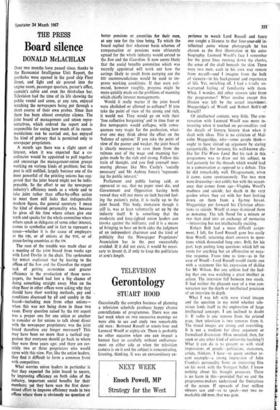Board silence
THE PRESS DONALD McLACHLAN
Over two months have passed since, thanks to the Economist Intelligence Unit Report, the portholes were opened in the good ship Fleet Street, and light and air poured into the engine room, passenger quarters, purser's office, captain's cabin and even the third-class bar. Television had the time of its life showing the public round and some, at any rate, enjoyed watching the newspapers being put through a short course of their own probes. Since then there has been almost complete silence. The joint board of management and union repre- sentatives, which ordered the report and is responsible for seeing how much of its recom- mendations can be carried out, has enjoyed the kind of privacy that is permitted only to newspaper proprietors.
A month ago there was a slight spurt of interest, when it was expected that a co- ordinator would be appointed to pull together and encourage the management-union groups working on various kinds of problem; but the post is still unfilled, largely because one of the most powerful of the printing unions has sug- gested that the joint board might not be indis- pensable. So the effort to see the newspaper industry's efficiency needs as a whole and to take joint rather than office-by-office action to meet them still lacks that indispensable modern figure, the general secretary. I mean the kind of devoted personality who, because he gives all his time where others give one tenth and speaks for the whole committee where others speak as delegates of some other interest, comes to symbolise and in fact to represent a cause—whether it is the cause of employers at the cm, or of unions at the Thc, or of peace-loving countries at the UN.
The root of the trouble was made clear at a meeting of the joint board three weeks ago with Lord Devlin in the chair. The spokesmen for SOGAT explained that by leaving to the offices of the Sun and the Guardian the urgent task of getting economies and greater efficiency in the production of those news- papers, the board had lost a big chance of doing something straight away. Men on the
shop floor in other offices were asking why they should have their working methods, pay and conditions discussed by all and sundry in the
board—including men from other unions— when this was not being done in these two cases. Every question raised by the EIU report
was a proper one for one union or another to consider or for unions to talk about direct with the newspaper proprietors; was the joint board therefore any longer necessary? This may have been no more than a tactical sug- gestion that everyone should go back to where they were three years ago; and there are cer- tainly two or three proprietors who would agree with this view. For, like the union leaders, they find it difficult to form a common front with competitors.
What worries union leaders in particular is that they expected the joint board to secure, by improving efficiency on both sides of the industry, important social benefits for their members; yet they have seen the first deter- mined effort to improve efficiency made in two offices where there is obviously no question of
better pensions or amenities for their men, at any rate for the time being. To which the board replied that whatever basic schemes of compensation or pensions were ultimately agreed for the whole industry would extend to the Sun and the Guardian. It now seems likely that the social benefits committee which was recently appointed will work out how the savings likely to result from carrying out the EIU recommendations would be used to im- prove working conditions. If that were esti- mated, however roughly, progress might be more quickly made on the problems of manning which chiefly interest managements.
Would it really matter if the joint board were abolished or allowed to collapse? If you take the point of view of the strong and rich, it would not. They would go on with their `free collective bargaining' and in time four or five newspapers would collapse, with conse- quences very tragic for the profession, what- ever one may think about the effect on the 'balance of opinion.' If you take the point of view of the poorer and weaker, the joint board is .clearly necessary to save them from the ruinous cost of the wage and manning bar- gains made by the rich and strong. Follow this train of thought, and you find yourself mur- muring phrases like Mrs Castle's 'socially necessary' and Mr Aubrey Jones's 'represent- ing the public interest.'
Parliament and public having said, or appeared to say, that no paper must die, and Government and Opposition having both vowed they will not move an inch beyond feel- ing the patient's pulse, it is really up to the joint board. This body, immature though it still is, was at least voluntarily set up by the industry itself. It is something that the moderate and long-sighted union leaders can invoke against the militants; and it is a means of bringing to bear on both sides the judgment of an independent chairman and the kind of publicity that the Newspaper Proprietors' Association has in the past successfully avoided. If it did not exist, it would be neces- sary to invent it, if only to keep the politicians at arm's length.


































 Previous page
Previous page